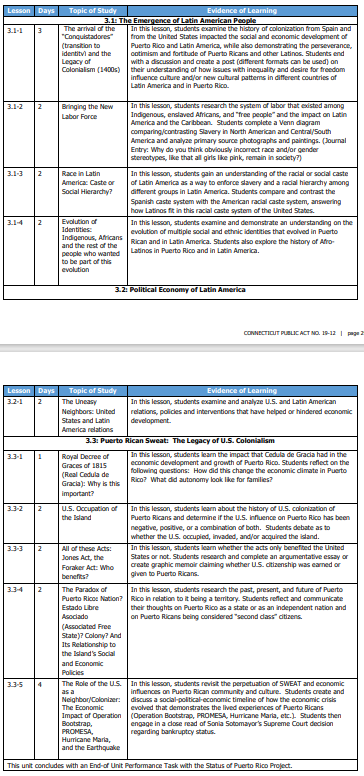UNIT 9: At-A-Glance

Overview
In this unit, students will:
•Explore how colonialism impacted the development of Latin America societies during a period of social, economic “transformation.”
•Examine and interpret how Latin Americans and Puerto Ricans constructed and interpreted racial, ethnic, class, and gender identities as a result of historic and economic experiences of enslaved Africans in Latin America and in Puerto Rico. •Investigate the ways in which United States relations with Puerto Rico and Latin America help or hinder social and economic growth.
•Examine specific role of Indigenous, Spaniards, and Africans in the formation of the Puerto Rican Nation.
•Evaluate how severe economic policies impact the economic growth of Puerto Rican and Latin America currently.
Compelling Question: How did power and hierarchy come together to create the social and economic structures of Puerto Rico and Latin America?
Pre-Assessment: KWL about students’ current understanding of colonialism, United States’ relations with Puerto Rico, and Latin America help or hinder social and economic growth.
Relevant Content Standards and Related Supporting Standards
Connecticut Elementary and Secondary Social Studies Standards
Dimension 2 Applying disciplinary concepts and tools
US.Inq.3.a. Gather relevant information from multiple sources representing a wide range of views and mediums while using the origin, authority, structure, context, and corroborative value to guide the selection of credible sources.
US.Inq.3.b. Organize and prioritize evidence directly and substantively from multiple sources in order to develop or strengthen claims (e.g., detect inconsistencies).
US.Inq.4.d. Present arguments and explanations that feature evocative ideas and multiple perspectives about United States History topics to reach a range of audiences and venues outside the classroom using print, oral, and digital technologies.
US.Inq.4.e. Analyze the characteristics and causation of national problems issues, both past and present, using a multidisciplinary lens.
From CT Core Standards for English Language Arts (i.e., Reading, Writing, Listening, Speaking)
CCSS.ELA-Literacy.RH.9-10.5 Analyze how a text uses structure to emphasize key points or advance an explanation or analysis.
From CT English Language Proficiency (CELP) Standards (i.e., Reading, Writing, Listening, Speaking and Language)
CELP.9-12.4.L.6 Acquire and use accurate general academic and domain-specific words and phrases, sufficient for reading, writing, speaking, and listening at the college and career readiness level; demonstrate independence in gathering vocabulary knowledge when considering a word or phrase important to comprehension or expression.
From Social Justice Standards from “Learning for Justice”
Identity
4. Students will express pride, confidence and healthy self-esteem without denying the value and dignity of other people
Overarching Learning Objectives
LO2 INVESTIGATE the evolution and development of African American/Black and Puerto Rican/Latino identities, including intersections with Indigenous and other identities.
LO3 ANALYZE how race, power, and privilege influence group access to citizenship, civil rights, and economic power.
L04 EXAMINE the scope and legacy of resistance that has been integral to African American, Black, Puerto Rican, and Latino(a) histories.
LO8 EXAMINE examples of African American/Black and Puerto Rican/Latino action in addressing issues impacting their communities.
LO9 IDENTIFY resources and opportunities for active engagement, learning, and civic responsibility.
LO10 USE the inquiry cycle to take informed action.
LO11 INVESTIGATE which elements of the Latino culture have influenced your daily life.
Overarching Essential Questions
EQ4 FREEDOM, JUSTICE, RESISTANCE How have African American, Puerto Rican and Latino people fought for freedom and justice throughout history and today, and in what ways have their struggles been in solidarity with various other groups?
EQ5 SOCIETY, ECONOMY, AND CULTURE How and in what ways have African American, Puerto Rican and Latino people shaped American society, economy, and culture?
EQ6 RADICAL IMAGINATIONS What do African American, Puerto Rican, and Latino history and culture teach us about radically reimagining new possibilities and more just futures?
EQ7 SPACE AND PLACE In what ways have geographies shaped history, as well as been shaped by it? What are the African American, Puerto Rican and Latino histories of our region, and how do they relate to broader histories?
Theme/Content Specific Enduring Understandings
Knowledge:
Examine the scope and legacy of colonization and resistance that has been integral to Puerto Rican and Latino populations.
Evaluate the diverse experiences of the enslaved natives and Africans enslaved in Latin America.
Analyze and describe the history of how U.S. relations and policies impacted both positively and negatively the social and economic development of Puerto Rico and Latin America.
Skills:
Analyze primary sources representative of social, cultural, and political and economics of Latinos and Puerto Ricans during a specific time period
Communicate more effectively in oral, written and artistic form.
Identify and contextualize historical sources written from the perspective of “missing voice.”
Theme/Content Specific Inquiry
For this Unit of Study, to support self-discovery, identity development, and civic preparedness/actions, students will explore…
What were the effects of the arrivals of “Conquistadores” on the Indigenous populations in Latin America and in Puerto Rico? What were the motivating factors for colonization?
How did the slave trade affect Latin America?
What were the implications of the integration of both the Indigenous peoples and Africans into colonial society?
All nations have different identities and the U.S. was formed with and by people of different origins and beliefs. Do those differences make the U.S. stronger?
What aspects of African and Indigenous cultures remain today in Latin America?
Was United States citizenship earned or given to Puerto Ricans?
Evidence of Learning
Pre-Assessment/Common Misconceptions
Pre-Assessment: KWL about what students know about the topics that will be studied in the unit
Formative Assessments/Checks for Understanding
Exit Tickets and 3 2 1
Venn Diagram
Compare and Contrast “slavery”
Debate on Encomienda system
Socio-political-economic timeline
Performance Tasks and Criteria/Project-Based Applications (Aligned with Compelling Question)
Graphic Memoir Project